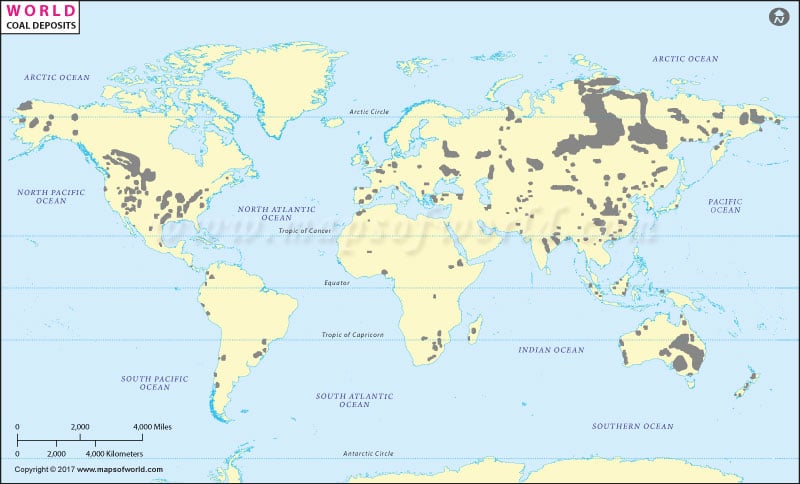Coal was the first fossil fuel used to generate electricity. 75 per cent of the coal mined is used to generate electricity. Coal is burned to make steam that rotates the turbine and generates electricity.
Coal is a combustible sedimentary rock. It was formed from plant remains that have been compacted, hardened and chemically altered over geologic time.
Depending upon the carbon content, coal is classified as:
-
- Anthracite: more than 85 % carbon
- Bituminous: 45-85 % carbon
- Sub-bituminous: 35-45 % carbon
- Lignite: less than 35 % carbon
Distribution
The coal deposits although exist in nearly every region, but commercially exploitable deposits occur in Europe, Asia, North America and Australia. In 1999, China was the top producer as well as the top consumer of coal. The top three coal producing countries are China, USA and India. The order of consumption also follows the same pattern.
Top Coal Reserves/Deposits Countries in the World |
| Ranking | Country | Total Recoverable Coal Reserves in 2008 (million tons) | % of World |
|---|---|---|---|
| 1 | United States | 237295 | 22.6 |
| 2 | Russia | 157010 | 14.4 |
| 3 | China | 114500 | 12.6 |
| 4 | Australia | 76400 | 8.9 |
| 5 | India | 60600 | 7 |
| 6 | Germany | 40699 | 4.7 |
| 7 | Ukraine | 33873 | 3.9 |
| 8 | Kazakhstan | 33600 | 3.9 |
| 9 | South Africa | 30156 | 3.5 |
| 10 | Serbia | 13770 | 1.6 |
| 11 | Colombia | 6746 | 0.8 |
| 12 | Canada | 6528 | 0.8 |
| 13 | Poland | 5709 | 0.7 |
| 14 | Indonesia | 5529 | 0.6 |
| 15 | Brazil | 4559 | 0.5 |
| 16 | Greece | 3020 | 0.4 |
| 17 | Bosnia and Herzegovina | 2853 | 0.3 |
| 18 | Mongolia | 2520 | 0.3 |
| 19 | Bulgaria | 2366 | 0.3 |
| 20 | Pakistan | 2070 | 0.3 |
| 21 | Turkey | 2343 | 0.3 |
| 22 | Uzbekistan | 1900 | 0.2 |
| 23 | Hungary | 1660 | 0.2 |
| 24 | Thailand | 1239 | 0.1 |
| 25 | Mexico | 1211 | 0.1 |
| 26 | Iran | 1203 | 0.1 |
| 27 | Czech Republic | 1100 | 0.1 |
| 28 | Kyrgyzstan | 812 | 0.1 |
| 29 | Albania | 794 | 0.1 |
| 30 | North Korea | 600 | 0.1 |
| 31 | New Zealand | 571 | 0.1 |
| 32 | Spain | 530 | 0.1 |
| 33 | Laos | 503 | 0.1 |
| 34 | Zimbabwe | 502 | 0.1 |
| 35 | Argentina | 500 | 0.1 |
| 36 | All others | 5613 | 0.7 |

